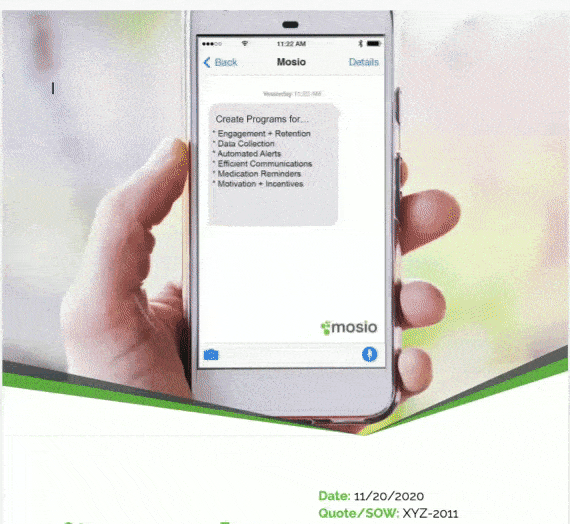Patient recruitment strategies in clinical trials demand efficiency, effectiveness, and a personal touch to reach a diverse patient pool. Traditional methods of recruitment often fall short, making it challenging to meet enrollment goals.
Are you…
- Finding it hard to engage patients quickly?
- Losing participants due to ineffective follow-up?
- Struggling with low response rates?
Recruiting patients for clinical trials has always been challenging. But in a world where 98% of text messages are read (compared to only 22% of emails), adopting SMS as a patient recruitment strategy is a powerful solution.
This article is for:
- Clinical trial coordinators
- Research teams seeking higher enrollment
- Those looking for efficient patient recruitment strategies
Why Do Patient Recruitment Strategies In Clinical Trials Struggle To Succeed?
Reaching potential participants at the right time, in the right way, remains a top challenge for clinical trial teams. Many studies rely on emails or phone calls for recruitment, which can be less effective. With patients often overwhelmed by emails and screening calls, they may ignore recruitment messages. Text messaging, however, stands out as a method to communicate directly and get quick responses.
How Can Text Messaging Transform Patient Recruitment?
Research shows that 85% of patients prefer receiving text messages over email, voicemail, or phone calls. Why? Texts are accessible and immediate, allowing patients to respond or act with minimal effort. Using SMS as part of your recruitment strategy increases enrollment while minimizing the resources spent on outreach and follow-up. Even a 1.5% increase in texts sent to potential participants can lead to a 1% increase in enrolled subjects.
How To Improve Clinical Trial Recruitment Through Direct Communication
Building direct communication pathways with potential trial participants improves response rates. Traditional recruitment methods lack the immediacy that text messages bring. SMS not only reaches patients faster, but statistics show that 90% of text messages are read within the first three minutes, enabling faster response times and better follow-up. This timely communication is essential in recruiting participants who may otherwise lose interest due to lengthy recruitment processes.
Increased Read Rates & Immediate Engagement
Using SMS as a patient recruitment strategy significantly raises read and response rates. Texts boast a 98% read rate, making them a superior choice compared to emails or phone calls. With nearly all messages being read, research teams have a greater chance of connecting with potential participants.
Simple Two-Way Communication
Text messaging allows for streamlined two-way communication. Patients can ask questions, confirm appointments, or request more details, making them feel actively involved in the process. This instant access to information through SMS increases patient satisfaction, and a patient who feels informed and valued is more likely to stay engaged.
What Benefits Does SMS Bring To Patient Recruitment Strategies In Clinical Trials?
Text messaging optimizes communication at every stage of the patient recruitment process. Participants receive clear, timely instructions, reminders, and updates. SMS can be used for appointment reminders, study updates, or last-minute notifications, which keep patients connected to the study. These benefits translate into improved patient retention and data collection, reducing time and money spent on replacement recruiting.
Automated Reminders Improve Adherence
Automated SMS reminders eliminate the need for manual follow-ups. This efficiency boosts adherence by ensuring participants attend their scheduled appointments or complete required steps. Automated SMS also provides gentle nudges that keep the study at the forefront of the participant’s mind, ensuring high levels of engagement.
Reduced Costs For Research Teams
With text messaging as a primary communication tool, research teams save time and resources that would otherwise be spent on phone calls or mail. SMS also minimizes the manual data entry associated with traditional methods. Patient recruitment strategies that focus on text messaging not only engage more participants but also help keep costs low, making trials more feasible within budget constraints.
How To Improve Patient Recruitment In Clinical Trials With Personalized Texts
Effective patient recruitment in clinical trials involves more than just reaching out; it requires personalized communication. Personalizing SMS messages with the participant’s name or other relevant details increases their sense of involvement. Text messaging software can send automated, tailored messages at different stages, ensuring each participant receives the right message at the right time.
Making Patients Feel Valued
Personalization makes participants feel recognized and appreciated. When patients receive a message tailored to them, they feel more connected to the study. This connection reduces dropout rates, helping maintain consistent engagement and compliance throughout the trial period.
Automated Messaging Systems
Automated SMS platforms, like those provided by Mosio, allow research teams to create customizable message schedules that improve patient follow-up. Teams can set up workflows that automatically send messages based on participant responses or activity, ensuring each patient receives the information they need without manual intervention. This process not only saves time but also ensures no patient falls through the cracks.
Why Text Messaging Stands Out Among Patient Recruitment Strategies In Clinical Trials
As patient recruitment strategies change over time, text messaging continues to prove its effectiveness. Text messaging’s immediate response time and high engagement rate are unmatched, offering an ideal recruitment tool that encourages participant involvement from the first point of contact.
Consistent Communication Builds Trust
Text messaging fosters an environment of consistent and timely communication, which builds trust between participants and research teams. This trust is crucial, especially when participants may feel uncertain about committing to a clinical trial. Regular SMS updates keep participants informed, easing any concerns they might have and encouraging them to continue with the study.
Faster Enrollment For Timely Data Collection
For trials that require quick enrollment, text messaging is particularly valuable. With 90% of messages read in the first three minutes, research teams can achieve faster enrollment and proceed with the study without delay. This speed benefits both research teams and patients, enabling quicker data collection and study results.
How Can Research Teams Implement Text Messaging To Maximize Recruitment?
Implementing a text messaging system as part of your recruitment strategy is straightforward. Platforms like Mosio offer customizable solutions that enable automated SMS schedules and two-way communication. This setup allows research teams to manage patient engagement, send reminders, and collect data efficiently, all through a single platform.
Streamlining Enrollment With Mosio
Mosio’s platform is designed for researchers, making it easy to set up SMS lines for clinical trials. Once participants are enrolled, Mosio’s Storylines Module automates message delivery, ensuring each patient receives the right message at the right time. This automation frees up valuable time for research teams, allowing them to focus on other essential study tasks.
Saving Time & Increasing Efficiency
Using SMS in patient recruitment strategies in clinical trials means teams can spend less time on repetitive communication tasks. This efficiency benefits both patients and researchers, enabling more focused, effective study management.
Why Text Messaging Is The Future Of Patient Recruitment Strategies
The statistics make a compelling case for SMS in patient recruitment: 85% of patients prefer it, and 98% of texts are read. As clinical trials become more complex, adopting text messaging as a patient recruitment strategy offers an accessible, high-engagement option that benefits patients and research teams alike.
Text messaging provides a streamlined, reliable way to improve clinical trial recruitment. With SMS, research teams can improve patient recruitment in clinical trials and ensure higher adherence, faster response times, and better retention.
Using SMS for recruitment means better communication with potential participants, a more efficient enrollment process, and ultimately, more successful clinical trials.







